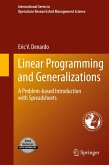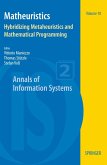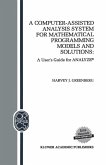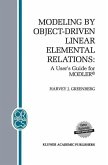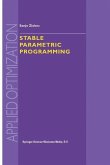The book is highly illustrated with chapter summaries and many examples and exercises. Students, researchers and practitioners in operations research and the optimization area will find it particularly of interest.
Review of First Edition:
"The discussion on modeling issues, the large number of examples used to illustrate the material, and the breadth of the coverage make 'Introduction to Stochastic Programming' an ideal textbook for the area." (Interfaces, 1998)
Dieser Download kann aus rechtlichen Gründen nur mit Rechnungsadresse in A, B, BG, CY, CZ, D, DK, EW, E, FIN, F, GR, HR, H, IRL, I, LT, L, LR, M, NL, PL, P, R, S, SLO, SK ausgeliefert werden.
"Help the students to understand how to model uncertainty into mathematical optimization problems, what uncertainty brings to the decision process and which techniques help to manage uncertainty in solving the problems. ... certainly attract also the wide spectrum of readers whose main interest lies in possible exploitation of stochastic programming methodology and will help them to find their own way to treat actual problems using stochastic programming methods. As a whole, the three main building blocks of stochastic programming ... are well represented and balanced." (Jitka Dupacová, Zentralblatt MATH, Vol. 1223, 2011)



